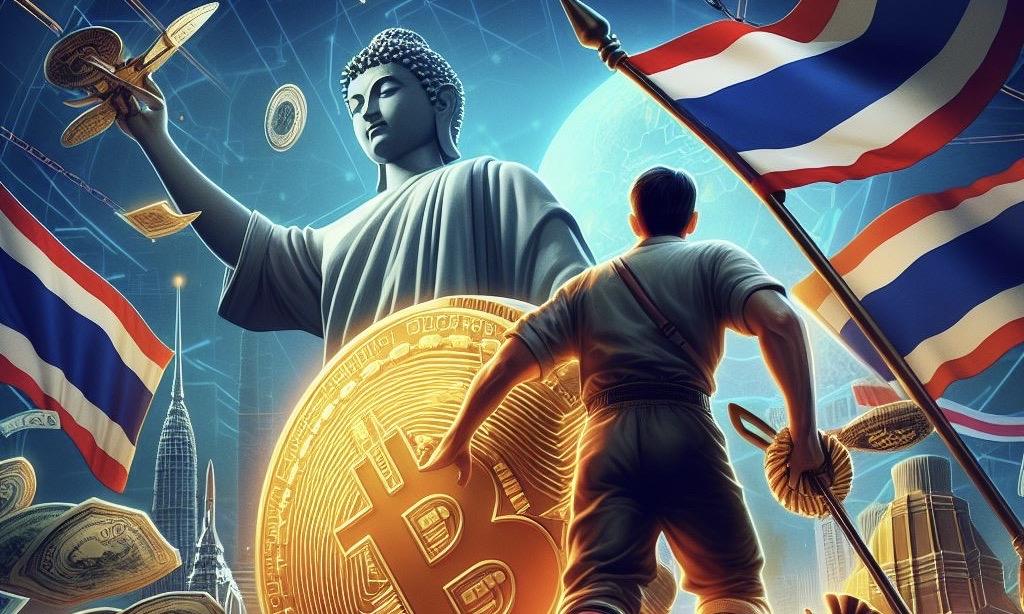In a significant regulatory move, Thailand's SEC will ban unlicensed cryptocurrency exchanges to tackle financial crimes, following similar actions by India and the Philippines. This crackdown aims to protect users from potential scams and enhance legal compliance.
Thailand Intensifies Crackdown on Unlicensed Crypto Exchanges Amid Regulatory Push
Thai authorities will prohibit unlicensed cryptocurrency exchanges from functioning in the nation to combat money laundering and other forms of internet crime, per Cointelegraph.
Thailand's Securities and Exchange Commission (SEC) will forward a list of unregistered cryptocurrency exchanges to the Ministry of Digital Economy and Society.
Thai SEC Secretary-General Pornanong Budsaratragoon made the order public during the Technology Crime Prevention and Suppression Committee's meeting on April 19.
India and the Philippines influenced Thailand's move to prohibit unlicensed enterprises, which recently prohibited all offshore exchanges that did not conform with local legislation.
To minimize the impact on the public, the Thai SEC advised crypto investors to withdraw their cash from unregistered sites before the ban went into force. A translation of the SEC announcement reads:
“The SEC would like to warn the public and investors to be careful of using services with unlicensed digital asset business operators because they will not be protected by law. There is also the risk of being deceived (scam) and being (associated with) money laundering.”
SEC Urges Due Diligence as Major Exchanges Face Closure Under New Thai Crypto Regulations
The Thai SEC recommended investors use the SEC Check First application to verify the platforms' license registrations before making any transactions. A cursory search of "Binance" reveals that the cryptocurrency exchange has yet to register and will be forced to close when the ban takes effect.
According to government records, other popular offshore cryptocurrency exchanges like Coinbase, KuCoin, Kraken, and OKX do not operate legally in Thailand.
European regulations may prohibit non-decentralized protocols. According to Markets in Crypto-Assets (MiCA), the new regulatory framework governing digital assets in the region, the European Commission must prepare a report by December 30 evaluating the decentralized finance (DeFi) market and the feasibility of sector-specific regulations.
Among several crypto entrepreneurs, MakerDAO co-founder Rune Christensen pointed out that the restrictions could subject various DeFi interfaces, such as decentralized exchanges, to licensing requirements.
“This would make DeFi frontends on normal internet domains, as we know them today, impossible. Only fully decentralized, local, downloaded frontends or full-KYC online frontends would be possible. Sad,” he wrote on X.
Photo: Microsoft Bing



 Samsung and SK Hynix Shares Hit Record Highs as Nvidia Earnings Boost AI Chip Demand
Samsung and SK Hynix Shares Hit Record Highs as Nvidia Earnings Boost AI Chip Demand  BTC Hovers Flat Near $68K Ahead of US-Iran Talks — Bulls Eye Break Above $70,050 for $78K Rocket
BTC Hovers Flat Near $68K Ahead of US-Iran Talks — Bulls Eye Break Above $70,050 for $78K Rocket  Snowflake Forecasts Strong Fiscal 2027 Revenue Growth as Enterprise AI Demand Surges
Snowflake Forecasts Strong Fiscal 2027 Revenue Growth as Enterprise AI Demand Surges  Trump Orders Federal Agencies to Halt Use of Anthropic AI Technology
Trump Orders Federal Agencies to Halt Use of Anthropic AI Technology  Synopsys Q2 Revenue Forecast Misses Expectations Amid China Export Curbs and AI Shift
Synopsys Q2 Revenue Forecast Misses Expectations Amid China Export Curbs and AI Shift  Samsung Stock Hits Record High on Nvidia HBM4 Supply Deal, Boosting AI Chip Rally
Samsung Stock Hits Record High on Nvidia HBM4 Supply Deal, Boosting AI Chip Rally  FxWirePro- Major Crypto levels and bias summary
FxWirePro- Major Crypto levels and bias summary  Nintendo Share Sale: MUFG and Bank of Kyoto to Sell Stakes in Strategic Unwinding
Nintendo Share Sale: MUFG and Bank of Kyoto to Sell Stakes in Strategic Unwinding  Hyundai Motor Group to Invest $6.26 Billion in AI Data Center, Robotics and Renewable Energy Projects in South Korea
Hyundai Motor Group to Invest $6.26 Billion in AI Data Center, Robotics and Renewable Energy Projects in South Korea  FxWirePro- Major Crypto levels and bias summary
FxWirePro- Major Crypto levels and bias summary  Microsoft Gaming Leadership Overhaul: Phil Spencer Retires, Asha Sharma Named New Xbox CEO
Microsoft Gaming Leadership Overhaul: Phil Spencer Retires, Asha Sharma Named New Xbox CEO  Nvidia Earnings Beat Expectations as AI Demand Surges, Stock Rises on Strong Revenue Outlook
Nvidia Earnings Beat Expectations as AI Demand Surges, Stock Rises on Strong Revenue Outlook 
































